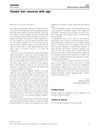 2 citations,
May 2017 in “Archives of Plastic Surgery”
2 citations,
May 2017 in “Archives of Plastic Surgery” The document concludes that understanding the evolution of the human face helps cosmetic surgeons meet aesthetic desires.
 3 citations,
October 2020 in “Journal of Investigative Dermatology Symposium Proceedings”
3 citations,
October 2020 in “Journal of Investigative Dermatology Symposium Proceedings” The main goal for new Alopecia Areata treatments should be significant improvement in scalp hair growth.
 4 citations,
May 2004 in “Facial Plastic Surgery Clinics of North America”
4 citations,
May 2004 in “Facial Plastic Surgery Clinics of North America” Hair transplantation helps women with hair loss; understanding and empathy lead to happy patients.
 110 citations,
January 2014 in “The Journal of Sexual Medicine”
110 citations,
January 2014 in “The Journal of Sexual Medicine” Testosterone treatment in trans men increases body and facial hair and may lead to hair loss over time, but severe skin issues are rare.
2 citations,
October 1973 in “Archives of internal medicine” The document likely discusses how to tell the difference between excessive hair growth and the development of male characteristics in women.
 41 citations,
October 2017 in “International Journal of Women's Dermatology”
41 citations,
October 2017 in “International Journal of Women's Dermatology” Most pregnant women experience skin darkening and hair changes, with these effects usually going away after giving birth.
 4 citations,
April 2020 in “Facial Plastic Surgery Clinics of North America”
4 citations,
April 2020 in “Facial Plastic Surgery Clinics of North America” Hair loss in women is complex to diagnose and treat, and hair restoration should be done by experts. Using minoxidil before surgery can help manage post-surgery hair shock loss. The Follicular Unit Transplantation method is recommended for women due to its speed, no need for shaving, and better graft quality. Strategies like L, T, and reverse L patterns can help restore central hair density, and regenerative methods can improve graft survival in hair transplants.
 18 citations,
March 2018 in “Archives of Plastic Surgery”
18 citations,
March 2018 in “Archives of Plastic Surgery” The superficial temporal artery flap is a reliable method for reconstructing complex facial defects with minimal complications.
 21 citations,
October 2017 in “Journal of the European Academy of Dermatology and Venereology”
21 citations,
October 2017 in “Journal of the European Academy of Dermatology and Venereology” Various potential triggers may be causing the rise in frontal fibrosing alopecia, and avoiding these could help stop the disease's increase.
 26 citations,
January 2020 in “Przegląd Menopauzalny”
26 citations,
January 2020 in “Przegląd Menopauzalny” Menopausal women have higher androgen levels, which can cause symptoms like facial hair growth and low sexual desire.
 May 2023 in “The journal of sexual medicine”
May 2023 in “The journal of sexual medicine” Ovarian Hyperthecosis caused hypersexuality in an older woman and was successfully treated with surgery.
 8 citations,
January 2015 in “Scars, burns & healing”
8 citations,
January 2015 in “Scars, burns & healing” Hair transplantation effectively treats burn scar alopecia, improving self-esteem and confidence.
 November 2019 in “Actas Dermo-Sifiliográficas”
November 2019 in “Actas Dermo-Sifiliográficas” Oral minoxidil helps treat hair loss and has reversible side effects.
 April 2020 in “Journal of the Endocrine Society”
April 2020 in “Journal of the Endocrine Society” A woman's high testosterone and related symptoms were caused by overactive cells in her ovaries.
 10 citations,
December 2010 in “British Journal of Dermatology”
10 citations,
December 2010 in “British Journal of Dermatology” After menopause, some women lose scalp hair and gain facial hair, with patterns suggesting different underlying causes.
April 2023 in “Dermatology and therapy” Most patients stop using topical minoxidil due to side effects.
 August 2014 in “Annals of Plastic Surgery”
August 2014 in “Annals of Plastic Surgery” The book is a detailed guide on hair restoration, useful for both new and experienced surgeons.
 26 citations,
January 2013 in “BioMed Research International”
26 citations,
January 2013 in “BioMed Research International” Hormonal changes after childbirth and menopause can lead to women's hair loss and facial hair growth, with a need for better treatments.
 August 2013 in “Facial Plastic Surgery Clinics of North America”
August 2013 in “Facial Plastic Surgery Clinics of North America” Hair restoration techniques and new cell sources improve hair loss treatments.
 November 2022 in “Journal of the Endocrine Society”
November 2022 in “Journal of the Endocrine Society” A woman's masculine features were caused by a rare ovarian tumor that produced male hormones.
 December 2014 in “Endocrinología y nutrición”
December 2014 in “Endocrinología y nutrición” The woman's rare combination of diseases suggests an unknown factor may predispose individuals to multiple endocrine diseases.
October 2024 in “Actas Dermo-Sifiliográficas” Finasteride and dutasteride can increase beard thickness in men.
 December 2011 in “British Journal of Dermatology”
December 2011 in “British Journal of Dermatology” As women age, they experience changes in hair density and volume, face challenges in distinguishing normal hair loss from disease, and have limited access to treatments for hair issues.
 September 2023 in “Kerala Journal of Ayurveda”
September 2023 in “Kerala Journal of Ayurveda” Ayurvedic treatment helped a woman with PCOS resume regular periods and improve symptoms without side effects.
 April 2019 in “Journal of the Endocrine Society”
April 2019 in “Journal of the Endocrine Society” A woman's severe male-like symptoms were caused by a rare, benign tumor in her ovary that produced male hormones.
51 citations,
June 1970 in “British journal of dermatology/British journal of dermatology, Supplement” Antiandrogens may help treat conditions like excessive hair growth, prostate tumors, male baldness, and acne by blocking male hormone effects.
 November 2022 in “Journal of the Endocrine Society”
November 2022 in “Journal of the Endocrine Society” A transman experienced lasting virilization symptoms after stopping testosterone, which were resolved with estradiol treatment.
 1 citations,
February 2017 in “Journal of Aesthetic Nursing”
1 citations,
February 2017 in “Journal of Aesthetic Nursing” Men are getting more beard transplants to look better and follow fashion trends.
 1 citations,
October 2015 in “Journal of endocrinology and diabetes”
1 citations,
October 2015 in “Journal of endocrinology and diabetes” Understanding Polycystic Ovary Syndrome (PCOS) and its causes can lead to effective treatments.
 1 citations,
July 2011 in “Climacteric”
1 citations,
July 2011 in “Climacteric” Long-term estrogen therapy in postmenopausal women can improve certain health markers, hair loss is common regardless of hormone use, stopping estrogen doesn't increase breast cancer risk, smoking does, and a balanced BMI is linked to lower mortality.


























